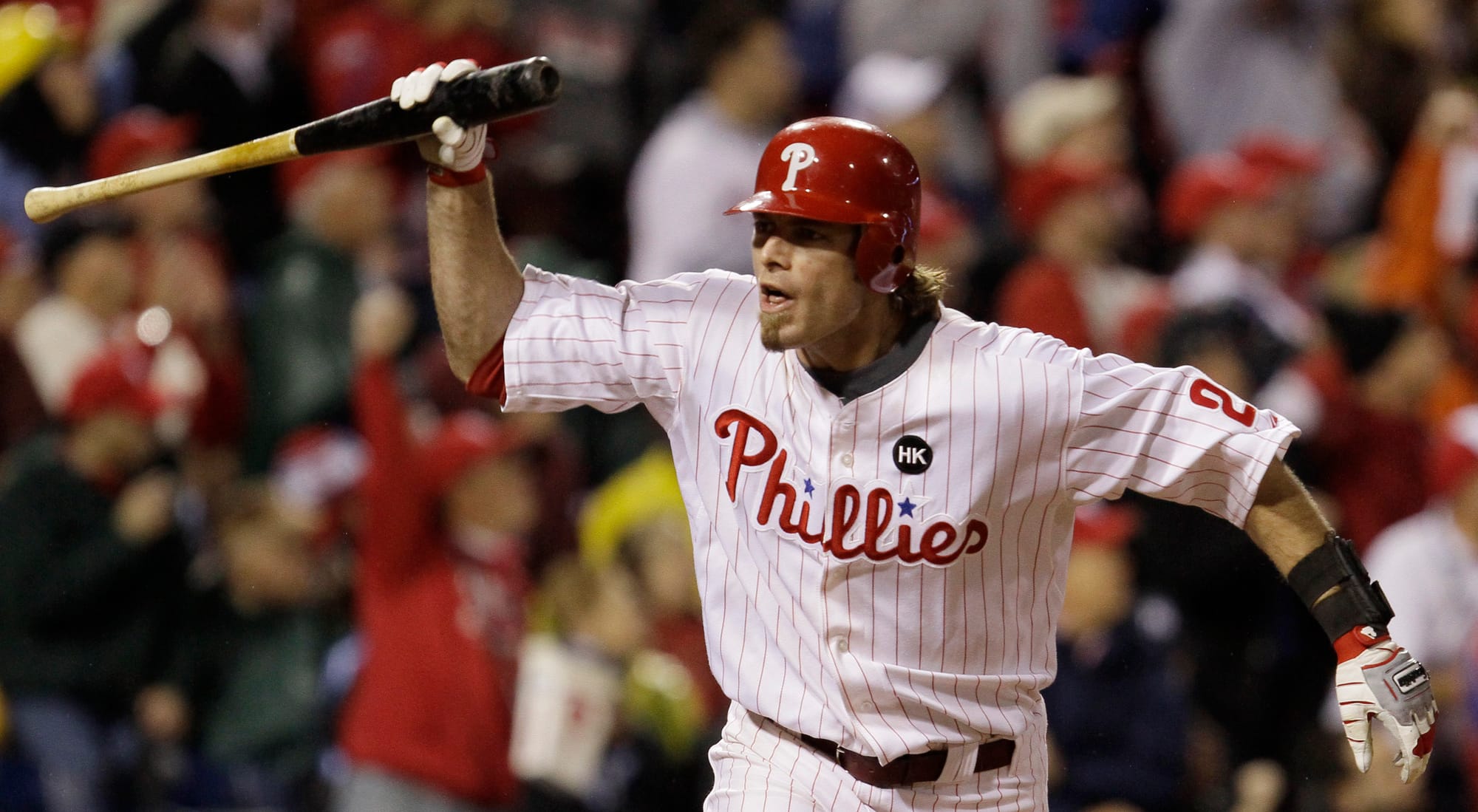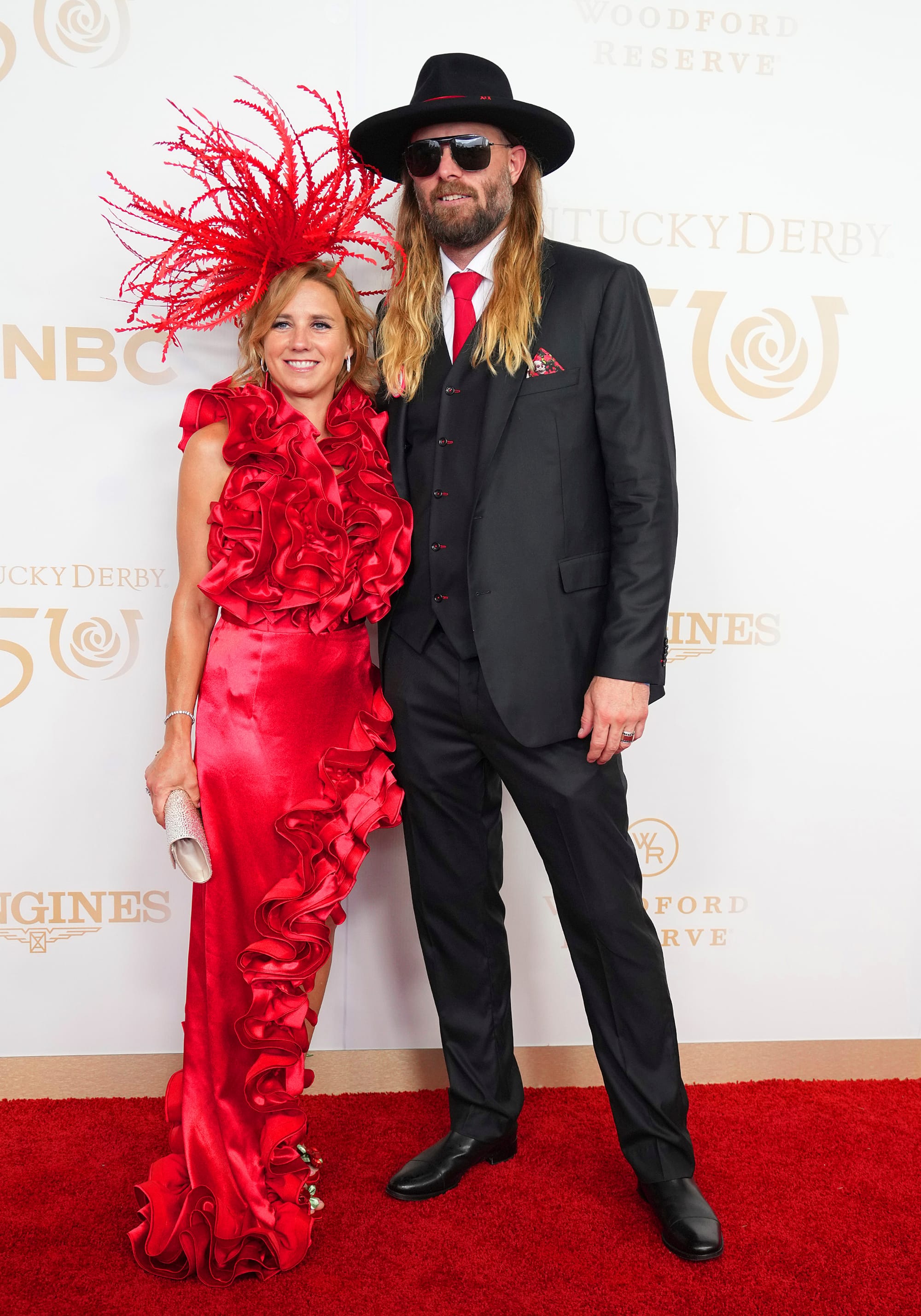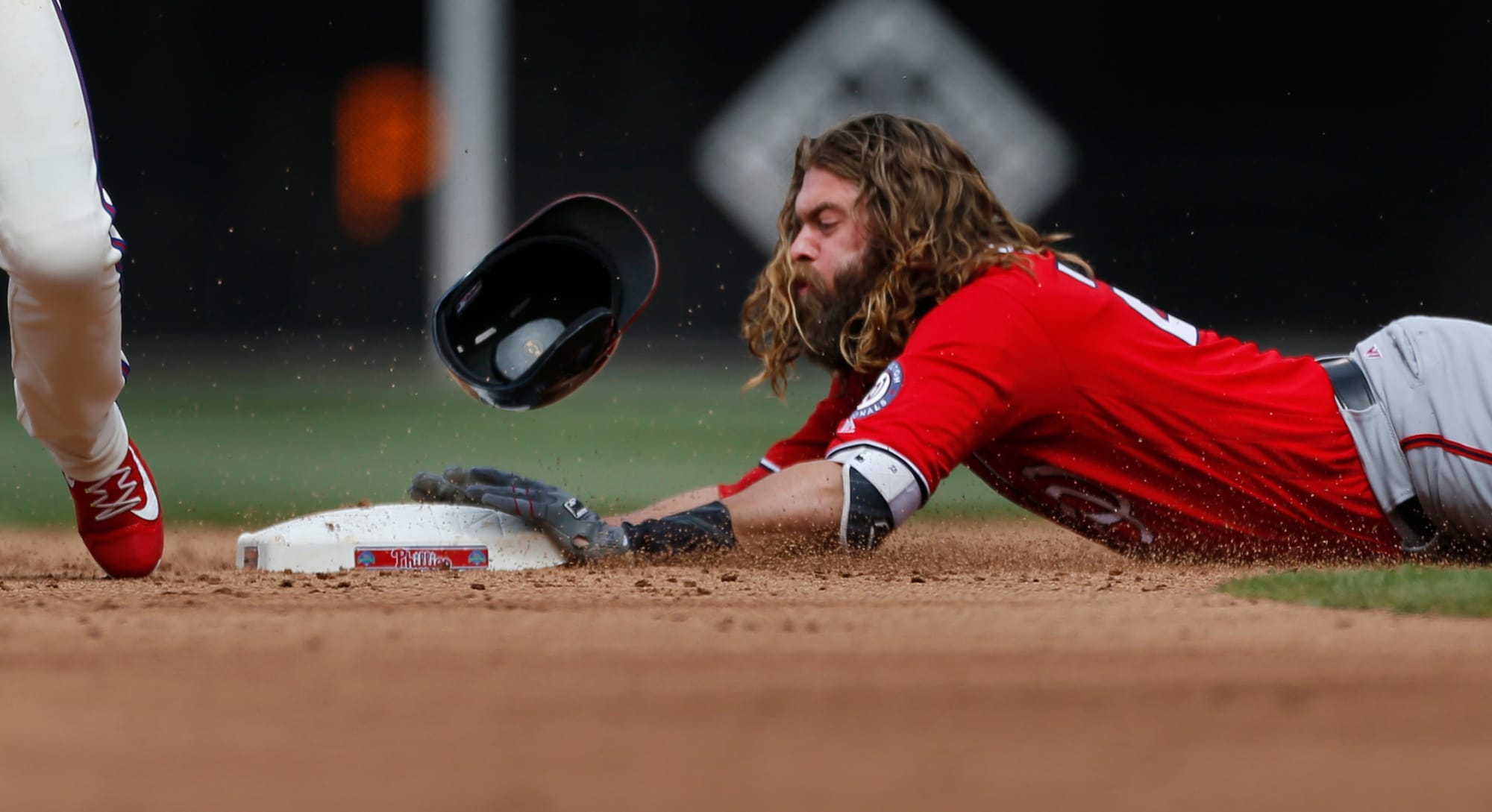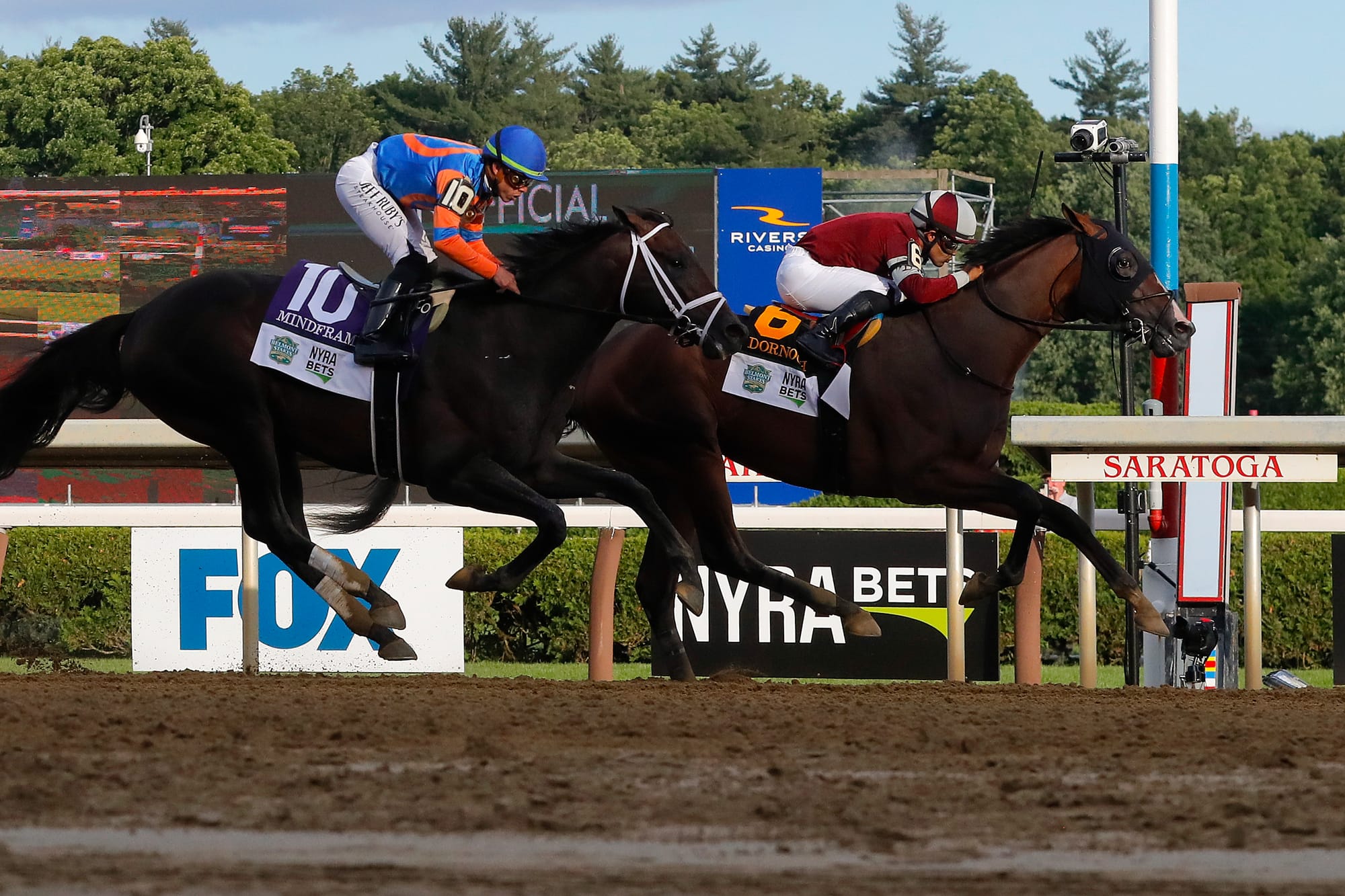There were more times than not in the life of Jayson Werth where the idea of going to see a man about a horse just didn’t connect in the way it eventually would.
But when you claw your way into the daily grind of Major League Baseball, when you come from an athletic family tree that is jaw dropping, when you win a World Series ring, when you walk-off a crucial game to keep your team in the hunt, when you are named to the All-Star team, when you sign a top-ten contract of your era, when you’re placed in the team’s Ring of Honor, you’ve earned the right to see a man about a horse.
Now, when said horse is a thoroughbred who fell short of winning the Kentucky Derby and looked in need of a pep talk, this man, Jayson Werth, he of the thick beard and big personality and flowing mane with bleached ends, discovered he was the man in the idiom, and the horse was named Dornoch.
As Werth tells it, following the Kentucky Derby loss in 2024, the thoroughbred wasn’t meeting expectations. And the retired big-leaguer, one of Dornoch’s owners, felt like the horse knew it.
“He’s an incredible dude,” Werth says of the horse, as if they’re pickleball buddies. “We call him Big Puppy. I think he felt the frustration. So the week of the Belmont, we spent a lot of time with this horse, and we’re at the barn out back and at his stall, and I tell him a story.”
This story isn’t a fable. It’s closer to a parable, where the subject — Werth — shares a parallel experience with the horse — Dornoch — before “I bopped him on the head and told him, ‘This is it. This is your last chance at horse racing.’”
Nearly twenty years earlier, former Philadelphia Phillies general manager Pat Gillick had the same conversation with a struggling kid from Springfield, Illinois who owned a pedigree similar to the horse. The kind of conversation that Werth remembers today as “the biggest kick in the nuts” and “like a boot in your ass.”
So the man took his pep talk to the horse, and in a matter of days, would watch his steed respond in similar fashion to his younger self. Both man and horse found the best versions of themselves, as Dornoch won the Belmont Stakes by a half-length in a thrilling finish, cashing in on odds of 17-1.
Just as Werth had cashed in on his own odds all those years back.
Werth connects to our Zoom call with his cell phone. He’s walking up his driveway in Bradenton, Florida, holding the camera so I can see his property, which appears under construction.
Palms sway under blue skies, accented by those big poofy cumulus clouds. The tiled roof catches my attention.
“We got banged up pretty good by the hurricanes,” he says “The second one was a direct hit. We had tons of roof damage. Inside was a little banged up. We’re just getting the repairs done … I think we’re a little crazy with everything, but here we are.”

The 45-year-old has been in the news the past couple of years after he fell in love with horse racing. He’s been preaching fractional ownership — something that makes the sport more attainable. For example, you can buy into the action now for about $100,000. Of course, that’s no small sum. But when you consider the millions invested, well, it starts to seem reasonable.
He was also seen on Radio Row at the Super Bowl, promoting his business, Two Eight Racing, and his podcast, Off the Rails.
Werth is now inside his home, side-lit by a large window and seated in a giant winged back chair. He’s casual in a Belmont tee, shorts and a black ball cap. He turns his phone so the camera is horizontal, bringing into focus a framed Belmont poster behind him.
Immediately, I want to dive into his ridiculous family tree. It looks like this:
Mom: Elite sprinter who competed in the Olympic Trials and the 1978 World Games in the former Soviet Union. Her Illinois state track records were later broken by Jackie Joyner-Kersee, she of the six Olympic medals and four World Championships.
Great-grandfather: John Schofield, a Major League Baseball shortstop.
Grandfather: Ducky Schofield, who played 18 Major League seasons and won the 1960 World Series with Pittsburgh.
Uncle: Dick Schofield, who spent 14 seasons in the show, winning the 1993 World Series with Toronto.
Biological father: Jeff Gowan, a college football wide receiver at Illinois State who played one season in the St. Louis Cardinals farm system.
Stepfather: Dennis Werth, first baseman with the Yankees and Kansas City Royals.
Stepsisters: Hillary, an All-American heptathlete at UCLA, and a member of the U.S.A. Bobsled national team. Hannah, an All-American volleyball player at Nebraska, who later played professionally.
Sons: Jackson and Judah, who both attended the IMG Academy in Florida, with Jackson playing some college baseball.
“I grew up in a big-time sports family,” Werth says casually. “My grandpa, he had a big influence. My mom re-married, and my stepdad became Dennis Werth. He kind of raised me and I became Jayson Werth as a result.”
The beneficiary of an electrifying gene pool, Werth took to baseball around age 11. He also played basketball, and believes at 6 foot 5, Division I hoops was a possibility.
“But you know, baseball was my one and only true love,” he says. “I was planning to go to college. I signed with the University of Georgia. But my senior year I was drafted in the first round by the Baltimore Orioles, and that was an easy decision for myself.”
With his baseball pedigree, it would have been fair to assume that 25 years ago, Werth would make a smooth transition through the Orioles system and eventually be starting in the outfield at Camden Yards.
Yet scripts are written with different twists and turns, and the writers’ guild felt it necessary to throw as much shit as possible at Werth, seeing if he could be derailed from what felt like destiny.
And it almost worked.


Werth in his championship attire: World Series in Philadelphia and the red carpet at the Kentucky Derby. [AP photos]
“We played a ton of wiffle ball, growing up in the backyard, and at my grandma and grandpa’s house. And it was like, that's all I ever wanted to do. My mom tells a story about when I was 4. She would have to throw batting practice to me with a wiffle ball and a wiffle bat because if she didn't, I would freak out, you know?
“Now, there were some times there when I got into pro ball that it started to look like maybe it wasn't in the cards. I had a rough Double-A season, but then I came back in 2001 and I got traded to Toronto.”
With another season of AA ball behind him, Werth made his major league debut with the Blue Jays in 2002, appearing in 15 games. In 2003, he was feeling good in Toronto before being traded to the Los Angeles Dodgers.
“I had a breakout season with the Dodgers. I hit 16 homes runs. And then it’s 2005, I was slated to be the opening day left fielder for the Dodgers. And I got hit by an A.J. Burnett fastball in spring training.”
Suddenly, his momentum was stalled. Surgeries on his wrist were required. He missed all of 2006 after playing in 191 games with the Dodgers over three seasons. But he found a surgeon at the Mayo Clinic, the renowned Dr. Richard Allen Berger, who told the worried Werth he could fix his malady.
“That was good news.”
In 2007, Werth signed with the Philadelphia Phillies, looking to resurrect a career that had been on pause for nearly three years. And whether it was fate, or the writers’ room, or divine intervention, he was about to be rewarded with another look in the majors despite an unimpressive rehab assignment.
“I was down on assignment. There was some trouble with my wrist and I was trying to get going. The trade deadline was coming up and they had a couple of injuries, and then they tried to make a trade for Carlos Beltran and they couldn’t get it done.
“So they called me up. I was like 1-for-16 on my rehab assignment. I hadn't played in three years. And, I'm in the lineup the next day at Wrigley Field.”
In that big winged back chair, with one leg crossed over the other and a single hand holding the phone in front of him, Werth shakes his head and laughs at the memory. He was getting another chance, yes. But this is also where his inspiration for the pep talk with Dornoch enters the equation.
“Before I go out on the field, Pat Gillick grabs me and he's like, ‘Hey, I just want to let you know, this is your last chance.’”
There was the boot in the ass. The punch to the gut. It felt a little personal. Gillick was with the Orioles when Werth was drafted. He brought him to the Phillies. He was a friend of the family, having been in the minors with Werth’s stepdad.
Werth didn’t like it.
“It was unexpected. I was mad. So I went out and got two hits that night. Then I got four hits the night after that. I didn’t come off the field for what felt like 10 years.”
Looking back — because hindsight is the equalizer of all measures — Werth can see the value in Gillick’s frankness.
“What would have ever happened if he didn’t? I don’t know. But it was pretty crazy.”
The modern lens allows him to look back and celebrate what was. There was the 2008 World Series title with the Phillies. The big contract with the Washington Nationals. Two consecutive seasons batting over .300. An All-Star Game appearance. I wanted to know what he cherished most from his playing days.
The ultimatum was on his list. How he responded, going 14-for-20 in the month of August. The team chasing down the New York Mets and erasing a seven-game deficit in the final 17 games that same year.
And then he takes a left turn to Nowhereville and a clash involving former Phillies manager Charlie Manuel. Being slighted doesn’t sit well with Werth.
“So I wasn't playing every day. I was just playing against lefties. And, you know, I felt like I should be playing every day. I was arguably the best outfielder on the team.

“It took like an act of Congress to get them to put me out there every day. Me and Charlie would have these just awful conversations, altercations — at times screaming matches in between 2007 and 2008 for me to get playing time.
“And it was like pulling teeth. Charlie would always put me in these awful situations. Usually as a manager, you want to put your player in a situation to succeed. Charlie did the opposite with me. And he thought it was funny.
“So, everything that I got with the Phillies, I had to earn, because of Charlie. So to finally get to 2008 and have that bang-up season … winning the World Series. I hit .444 in the World Series.”
Werth went on to lament how his injuries potentially derailed a Hall of Fame career. The injuries, and “Charlie being a dickhead,” didn’t allow him to complete a compelling resume. While he didn’t have the credentials to be inducted into Cooperstown, he did have a career that a thousand ball players would trade for without hesitation.
And yet, despite all that, there is a piece of him there, in the leafy enclave in the middle of New York state near the shore of Otsego Lake.
Following the ’08 title, the Hall of Fame asked for his spikes to place in an exhibit.
“That was awesome,” he says.
“You're not even breathing while you're cheering the guy around,” Werth says of watching a horse he owns perform. "And that's the feeling you get in horse racing. It just rips your heart out of your chest.”
Retirement from the majors brought a move to Florida when his sons enrolled at IMG Academy. Werth was searching for his post-career purpose.
“I started playing golf with these guys up here that own some Florida 'breds. And Richard Rose was one of them. He's a name in horse racing. So he was one of the guys that got me into it.”
The bug bit him quick and stung him hard. His first big moment came with filly R Calli Kim, who put up multiple wins, before Dornach broke through. He’s been obsessed ever since.
“It's a rush, right? It's a thrill when you own the horse, it's different than when you just go and beat the horse. You got to own the horse. You got to have skin in the game.

“And you know these things become like your pets. And then when they run, it's like they leave the gate … it's like you're back on the field. You get this feeling like you're playing again, which is what drew me to the sport. I was like, man, I didn't even know I had missed this feeling like that.
“You can't duplicate that type of feeling where you're in the dugout in a big game or you're on first or second in a big game and somebody is up and it’s late in the game when somebody hits a ball in the gap and even if you're in the dugout or you're on the bases and it's like all hell breaks loose and you can't even breathe, you're not even breathing while you're running.”
Thus, the bug bite has turned into a fever dream.
Werth is now running an investor’s syndicate, where he says they have raised $3.1 million. That money will turn into fractional shares of different horses. With that often comes the VIP experience — parties, fine dining and all the fancy hats and mint juleps you can handle.
The podcast is an add-on — another way for Werth to quench his thirst at the trough.
It’s not all winners circles and rose garlands, however. It’s real money, and sometimes things don’t work out. Werth says this is where fractional ownership has its benefits. He admits to being heckled at times for acting like he owns 100 percent of Dornoch.
His has a fitting answer for the critics.
“Ten percent is enough. Five percent would be enough. One percent would be enough because he's yours. You know, like that's your race horse. That's your horse that toes the line every day, that's just going to war for you.
“I think the experience through the ownership, even at fractional levels, is extraordinary.”
Matthew Fults is author of the award-winning novel, The Scotland Project, available from your favorite bookseller.
